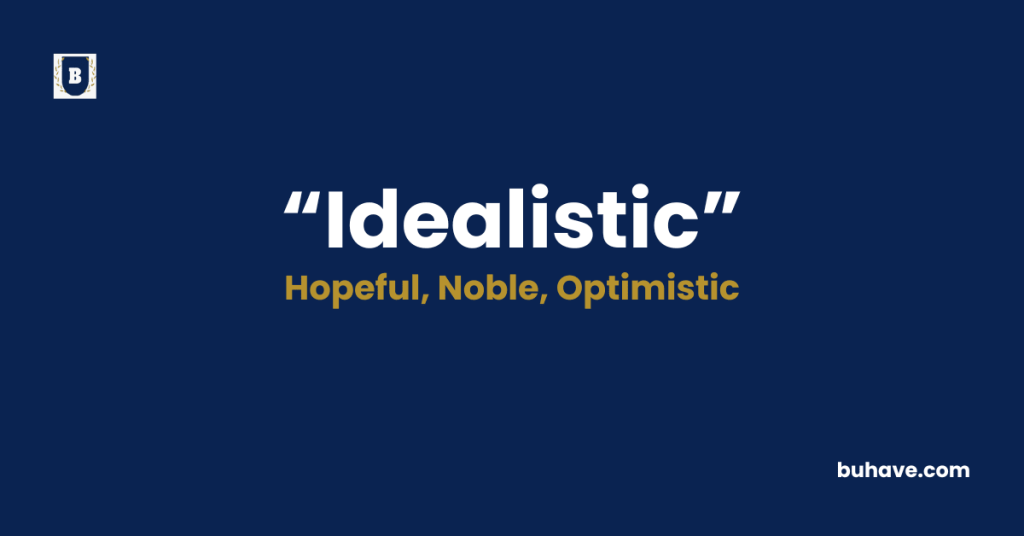The word ‘Idealistic’ (Adjective) describes someone who holds high, often unrealistic or impractical, standards or beliefs about how things should be. in this guide, you’ll learn the full definition, synonyms, antonyms, etymology, and real-life examples of how to use ‘Idealistic’ correctly in sentences.
Idealistic Explained in Depth
A complete and detailed guide to the words Idealistic including meaning, definition, examples, etymology, synonyms, and antonyms.
Meanings of Idealistic
Idealistic refers to the tendency to believe in or pursue high standards, principles, or goals that may seem unrealistic or difficult to achieve. At first, the term often described individuals who dreamed of a perfect world, focusing on ideals such as justice, equality, and peace. In addition, being idealistic means having a strong sense of what is morally right, even when the reality around you might not align with those beliefs. Moreover, idealistic people often work toward improving society or their communities, driven by the belief that things can be better, even if the road to change is challenging. Eventually, this trait can inspire others, sparking movements or efforts to bring about positive transformations.
Today, being idealistic is still associated with optimism and a desire to make the world a better place, but it often faces criticism for being disconnected from practical reality.
Definition:
Idealistic describes someone who holds high, often unrealistic or impractical, standards or beliefs about how things should be. At first, idealism often focuses on envisioning a perfect world or society, where everything operates according to principles of justice, peace, and fairness. In addition, idealistic individuals believe in the possibility of achieving these ideals, even when the world around them may seem far from perfect. Moreover, being idealistic can also mean striving for moral excellence, with the conviction that the right choices will lead to the best outcomes, even if they are difficult or improbable.
Eventually, idealism can motivate people to pursue ambitious goals and push for changes in society, yet it sometimes faces criticism for being overly optimistic or disconnected from reality.
Etymology:
The word “idealistic” originates from the word “ideal,” which comes from the Latin “idealis,” meaning “existing in idea” or “ideal.” At first, “ideal” referred to a perfect or ultimate form of something, often conceptual or abstract. In addition, the suffix “-istic” was added, which is used to describe something that pertains to a specific quality or characteristic. Moreover, the combination of these elements formed the term “idealistic” in the late 18th century, signifying someone or something that aligns with or strives for ideal forms or perfection. Eventually, the word took on a more specific meaning, referring to those who have a tendency to envision or pursue perfection, often without regard to practicality.
Today, the term reflects a belief in higher ideals, sometimes seen as unrealistic, yet inspiring in its vision for a better world.
Example Sentence:
- At first, his idealistic views about world peace seemed too ambitious, but over time, he inspired others to join his cause.
- Moreover, her idealistic approach to education led her to create a school that emphasizes creativity and self-expression.
- In addition, the idealistic vision of a utopian society motivated many to work toward social reforms, even when the challenges seemed overwhelming.
- Meanwhile, his idealistic beliefs about environmental conservation pushed him to start a campaign for sustainable living.
- Finally, while some dismissed her idealistic dreams as impractical, others admired her unwavering commitment to making a difference.
Idealistic Synonyms:
- Optimistic
- Visionary
- Utopian
- Dreamy
- Aspirational
- Unrealistic
- Hopeful
- Noble
- Impractical
- Romantic
Idealistic Antonyms:
- Realistic
- Pragmatic
- Practical
- Cynical
- Pessimistic
- Unimaginative
- Skeptical
- Materialistic
- Down-to-earth
- Rational
FAQs about Idealistic
Here’s a FAQ-style guide about the word “Idealistic”
1. What does “idealistic” mean?
“Idealistic” is an adjective that describes someone who is guided by high or noble ideals, often with a strong belief in how things should be, rather than how they are. It reflects hopeful, optimistic, or visionary thinking, sometimes at the expense of practicality.
2. How is “idealistic” used in a sentence?
“As a young teacher, she was idealistic about changing the education system.”
- “His idealistic views clashed with the company’s business realities.”
- “They pursued an idealistic vision of world peace.”
3. Is being idealistic a good thing?
It can be! Being idealistic means:
- Believing in better possibilities
- Upholding strong values or ethics
- Inspiring others through vision
However, it may also imply naivety or impracticality if not balanced with realism.
4. What are some synonyms and related words?
Visionary (more positive)
- Optimistic
- Romantic
- Unrealistic (potentially negative)
- Utopian
- Principled
- Noble-minded
Each captures a different aspect of ideal-driven thinking.
5. What is the opposite of “idealistic”?
- Realistic – grounded in practical or current circumstances
- Cynical – believing people are motivated by self-interest
- Pragmatic – focusing on results and practical solutions
Example:
- Idealistic: “We can eliminate poverty through compassion.”
- Realistic: “We can reduce poverty through policy reform and education.”
6. Is “idealistic” used positively or negatively?
Context matters:
- Positive: When describing someone with admirable values or inspiring goals
“She’s idealistic and determined to make a difference.” - Negative: When suggesting impracticality or inexperience
“His plans were too idealistic to succeed.”
7. What’s the difference between “ideal” and “idealistic”?
- Ideal (noun or adjective): The standard of perfection or excellence
“Honesty is her ideal.” - Idealistic (adjective): Believing or acting in accordance with ideals
“His idealistic nature led him to pursue nonprofit work.”

















